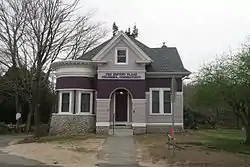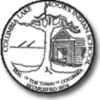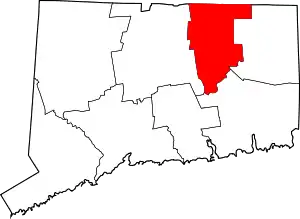Columbia, Connecticut | |
|---|---|
| Town of Columbia | |
 The History Place | |
 Seal | |
  | |
| Coordinates: 41°41′28″N 72°18′26″W / 41.69111°N 72.30722°W | |
| Country | |
| U.S. state | |
| County | Tolland |
| Region | Capitol Region |
| Incorporated | 1804 |
| Government | |
| • Type | Selectman-town meeting |
| • First selectman | Steven Everett (R) |
| • Selectmen | Lisa Napolitano (R) Christopher Lent (R) Judy Ortiz (D) William O'Brien (D) |
| Area | |
| • Total | 22.0 sq mi (57.0 km2) |
| • Land | 21.4 sq mi (55.3 km2) |
| • Water | 0.6 sq mi (1.6 km2) |
| Elevation | 551 ft (168 m) |
| Population (2020) | |
| • Total | 5,272 |
| • Density | 246.4/sq mi (95.3/km2) |
| Time zone | UTC−5 (EST) |
| • Summer (DST) | UTC−4 (EDT) |
| ZIP Code | 06237 |
| Area code(s) | 860/959 |
| FIPS code | 09-16400 |
| GNIS feature ID | 0213411 |
| Website | www |
Columbia is a town in the Capitol Planning Region, Connecticut, United States. The population was 5,272 at the 2020 census.[1] Originally a part of Lebanon, known as the North Society or Lebanon's Crank,[2] Columbia was incorporated in May 1804. The town was named for patriotic reasons after the national symbol "Columbia".[3] Columbia offers pre-kindergarten through 8th grade education in town at Horace W. Porter School, while high school students have a choice of attending four nearby high schools; E.O Smith High School, Bolton High School (Connecticut), Coventry High School, and Windham Technical High School, part of the Connecticut Technical High School System).[4]
Geography
According to the United States Census Bureau, the town has a total area of 22.0 square miles (57 km2), of which, 21.4 square miles (55 km2) of it is land and 0.6 square miles (1.6 km2) of it (2.78%) is water.
Demographics
| Census | Pop. | Note | %± |
|---|---|---|---|
| 1850 | 876 | — | |
| 1860 | 832 | −5.0% | |
| 1870 | 891 | 7.1% | |
| 1880 | 757 | −15.0% | |
| 1890 | 740 | −2.2% | |
| 1900 | 655 | −11.5% | |
| 1910 | 646 | −1.4% | |
| 1920 | 706 | 9.3% | |
| 1930 | 648 | −8.2% | |
| 1940 | 853 | 31.6% | |
| 1950 | 1,327 | 55.6% | |
| 1960 | 2,163 | 63.0% | |
| 1970 | 3,129 | 44.7% | |
| 1980 | 3,386 | 8.2% | |
| 1990 | 4,510 | 33.2% | |
| 2000 | 4,971 | 10.2% | |
| 2010 | 5,485 | 10.3% | |
| 2020 | 5,272 | −3.9% | |
| U.S. Decennial Census[5] | |||
As of the census[6] of 2000, there were 4,971 people, 1,864 households, and 1,463 families living in the town. The population density was 232.8 inhabitants per square mile (89.9/km2). There were 1,988 housing units at an average density of 93.1 per square mile (35.9/km2). The racial makeup of the town was 97.43% White, 0.38% African American, 0.08% Native American, 0.70% Asian, 0.06% Pacific Islander, 0.56% from other races, and 0.78% from two or more races. Hispanic or Latino of any race were 1.69% of the population.
There were 1,864 households, out of which 36.2% had children under the age of 18 living with them, 68.1% were married couples living together, 7.4% had a female householder with no husband present, and 21.5% were non-families. Of all households 17.3% were made up of individuals, and 6.8% had someone living alone who was 65 years of age or older. The average household size was 2.65 and the average family size was 3.01.
In the town, the population was spread out, with 26.2% under the age of 18, 4.6% from 18 to 24, 30.3% from 25 to 44, 28.1% from 45 to 64, and 10.9% who were 65 years of age or older. The median age was 40 years. For every 100 females, there were 95.8 males. For every 100 females age 18 and over, there were 94.7 males.
The median income for a household in the town was $70,208, and the median income for a family was $77,665. Males had a median income of $51,250 versus $37,685 for females. The per capita income for the town was $29,446. About 1.8% of families and 4.2% of the population were below the poverty line, including 6.0% of those under age 18 and 5.3% of those age 65 or over.
| Voter Registration and Party Enrollment as of October 29, 2019[7] | |||||
|---|---|---|---|---|---|
| Party | Active Voters | Inactive Voters | Total Voters | Percentage | |
| Democratic | 1,259 | 46 | 1,305 | 31.86% | |
| Republican | 986 | 36 | 1,022 | 24.95% | |
| Unaffiliated | 1,527 | 95 | 1,622 | 39.60% | |
| Minor Parties | 138 | 9 | 147 | 3.59% | |
| Total | 3,910 | 186 | 4,096 | 100% | |
| Presidential Election Results[8][9] | |||
|---|---|---|---|
| Year | Democratic | Republican | Third Parties |
| 2020 | 52.9% 1,888 | 44.8% 1,600 | 2.3% 80 |
| 2016 | 47.6% 1,558 | 45.8% 1,500 | 6.6% 215 |
| 2012 | 55.7% 1,715 | 42.9% 1,319 | 1.4% 43 |
| 2008 | 57.5% 1,843 | 40.8% 1,306 | 1.7% 55 |
| 2004 | 57.0% 1,771 | 40.9% 1,272 | 2.1% 64 |
| 2000 | 55.8% 1,567 | 37.1% 1,041 | 7.1% 196 |
| 1996 | 50.0% 1,271 | 31.9% 813 | 18.1% 452 |
| 1992 | 40.6% 1,158 | 29.5% 839 | 29.9% 855 |
| 1988 | 45.6% 1,082 | 53.6% 1,270 | 0.8% 19 |
| 1984 | 33.2% 673 | 66.2% 1,341 | 0.6% 11 |
| 1980 | 30.3% 593 | 51.2% 1,001 | 18.5% 361 |
| 1976 | 41.2% 720 | 58.5% 1,023 | 0.3% 6 |
| 1972 | 34.5% 583 | 64.7% 1,092 | 0.8% 13 |
| 1968 | 44.2% 647 | 52.5% 770 | 3.3% 48 |
| 1964 | 62.4% 791 | 37.6% 476 | 0.00% 0 |
| 1960 | 41.1% 450 | 58.9% 644 | 0.00% 0 |
| 1956 | 20.1% 246 | 70.9% 599 | 0.00% 0 |
On the National Register of Historic Places
Notable people
- Anthony Gregorc, psychologist. Currently resides in Columbia
- Dwight Loomis (1821–1903), US Congressman and Connecticut Supreme Court judge
- Alfred Wright (1788–1853), physician, Presbyterian missionary to Choctaw Nation, translator, educator and founder of Wheelock Seminary was born in Columbia
See also
References
- ↑ "Census - Geography Profile: Columbia town, Tolland County, Connecticut". Retrieved November 27, 2021.
- ↑ "History of Lebanon, CT". Retrieved August 1, 2012.
- ↑ The Connecticut Magazine: An Illustrated Monthly. Connecticut Magazine Company. 1903. p. 331.
- ↑ Columbia Board of Education. "High School Options". Retrieved January 12, 2022.
- ↑ "Census of Population and Housing". Census.gov. Retrieved June 4, 2015.
- ↑ "U.S. Census website". United States Census Bureau. Retrieved January 31, 2008.
- ↑ "Registration and Party Enrollment Statistics as of October 29, 2019" (PDF). Connecticut Secretary of State. Retrieved March 22, 2020.
- ↑ "General Election Statements of Vote, 1922 – Current". CT Secretary of State. Archived from the original on May 14, 2019. Retrieved December 21, 2020.
- ↑ "Election Night Reporting". CT Secretary of State. Archived from the original on April 28, 2016. Retrieved December 21, 2020.
External links

